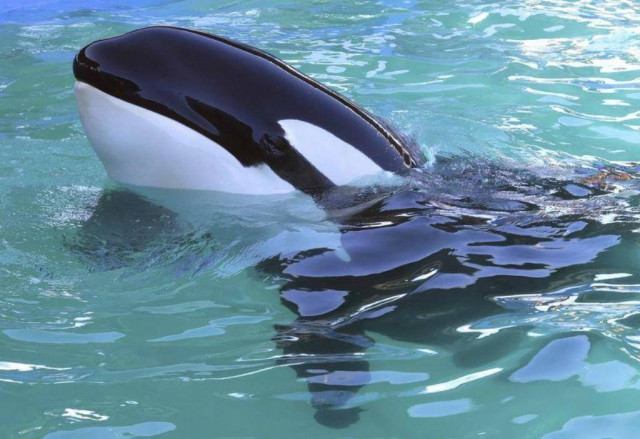Lonely Florida zoo orca gets 'endangered' protection
Female orcas typically live for about 50 years, but can live as long as 100 years, according to NOAA.

The now 7,000-pound (3,175 kilogram) Lolita is the only one of that group that is still alive. She is believed to be the oldest captive orca in the United States.
PHOTO: REUTERS
Advocates hope the ruling will lead to her release from the Miami Seaquarium where she has lived for the past 35 years, but the matter of Lolita's care remains at the center of a legal dispute.
She was captured as a juvenile from the waters off the western US state of Washington in 1970, along with six other calves that were sent to marine parks around the country.
The now 7,000-pound (3,175 kilogram) Lolita is the only one of that group that is still alive. She is believed to be the oldest captive orca in the United States.
Her wild relatives, known as the Southern Resident killer whales, were given endangered species protection by the US government a decade ago.
This protected status did not, however, apply to all orcas in the United States, or to those in captivity.
Animal rights groups petitioned the National Oceanic and Atmospheric Agency to revise the endangered listing, and to remove the exclusion of captive whales from the description.
"We find that Lolita's captive status, in and of itself, does not preclude her listing under the ESA (Endangered Species Act)," NOAA announced Wednesday.
"Accordingly, we are removing the exclusion for captive whales in the regulatory language describing the Southern Resident killer whale DPS (distinct population segment)."
The 20-foot (six-meter) orca lives alone in a 35-foot (10-meter) wide and 20-foot-deep tank at the Seaquarium.
Female orcas typically live for about 50 years, but can live as long as 100 years, according to NOAA.
"Today's proposed rule makes the possibility of Lolita's retirement to a seaside sanctuary tangible," said the Animal Legal Defense Fund in a statement.
"Were she to be released, she would be able to live her life with dignity, in an environment that more closely resembles her natural environment. There's even a possibility she could be reunited with her family!"
NOAA said the matter of Lolita's captivity is complex, and is being handled by another government agency.
People for the Ethical Treatment of Animals said it will push for Lolita to be retired from performing and transferred to a seaside sanctuary in her home waters off Washington's San Juan Islands, or even back to her own family pod if possible, since it is believed that her 86-year-old mother is still alive.
"This orca has been trapped for decades in the tiniest orca tank in North America and, for the past 10 years, deprived of the protection from harm and harassment offered by the Endangered Species Act," said general counsel to PETA Jeffrey Kerr.
"Now that this protection is rightfully hers, PETA will continue to push for her release into the sea, where she belongs."



















COMMENTS
Comments are moderated and generally will be posted if they are on-topic and not abusive.
For more information, please see our Comments FAQ